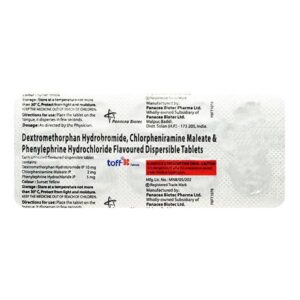DEXTROMETHORPHAN + Chlophenairamine
Dextromethorphan: Dextromethorphan is a drug that belongs to the class of medications known as antitussives (cough suppressants). It is commonly used to relieve dry coughs caused by conditions such as the common cold or bronchitis.
The exact mechanism of action of dextromethorphan is not fully understood, but it is believed to act on the cough center in the brain, suppressing the urge to cough. It does not treat the underlying cause of the cough but provides temporary relief by blocking the cough reflex.
Dextromethorphan is available in various forms, including pills, capsules, syrups, and lozenges. The dosage will depend on the specific formulation and the age of the patient. It is important to follow the instructions provided by the healthcare professional or those mentioned on the packaging.
Common side effects of dextromethorphan may include drowsiness, dizziness, nausea, vomiting, and stomach upset. Some people may experience allergic reactions such as rash, itching, or swelling of the face, tongue, or throat. It is also important to note that excessive and prolonged use of dextromethorphan can lead to a rare but serious condition called serotonin syndrome, especially when combined with certain medications or substances.
It is essential to consult with a healthcare professional before starting dextromethorphan or any cough suppressant, especially in children, as the use may vary depending on factors such as age, weight, and medical history.
Chlophenairamine: Chlorpheniramine is an antihistamine that is commonly used to relieve symptoms related to allergies, such as hay fever, hives, and itchy skin. It belongs to a class of drugs called first-generation antihistamines.
Mechanism of Action:
Chlorpheniramine works by blocking the effects of histamine, a natural substance produced by the body during an allergic reaction. Histamine is responsible for symptoms like itching, sneezing, runny nose, and watery eyes. By blocking histamine, chlorpheniramine helps to alleviate these symptoms.
Use:
Chlorpheniramine is used to treat allergic conditions including allergic rhinitis (hay fever), urticaria (hives), and allergic conjunctivitis (pink eye). It can also be used as a symptomatic treatment for cold symptoms, such as sneezing and runny nose.
Dose:
The typical adult dose of chlorpheniramine is 4 mg every 4 to 6 hours, with a maximum daily dose of 24 mg. However, dosages may vary depending on the individual and the condition being treated. It is important to follow the dosing instructions provided by the healthcare professional or as indicated on the package.
Side Effects:
Like any medication, chlorpheniramine may cause side effects. Common side effects may include drowsiness, dizziness, dry mouth, blurred vision, constipation, and urinary retention. These side effects are usually mild and temporary. However, if you experience any severe or persistent side effects, it is important to contact your doctor.
Chlorpheniramine can also interact with other medications, so it is important to inform your healthcare provider about all the medications, supplements, and herbal products you are taking before starting chlorpheniramine. Additionally, chlorpheniramine may cause drowsiness or impair your ability to drive or operate heavy machinery, so it is important to avoid activities that require alertness until you know how the medication affects you.
It is always recommended to consult with a healthcare professional or pharmacist for specific dosing instructions and to discuss any potential side effects or concerns.

